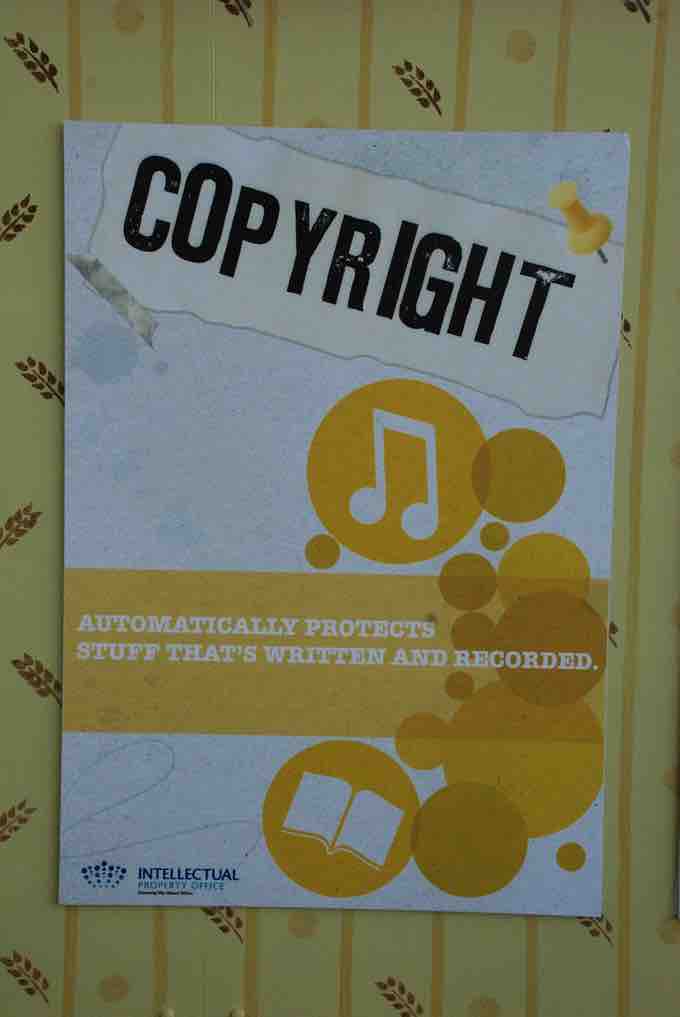Intellectual Property Issues of Digital Media
Copyright is a legal concept enacted by most governments to provide creators of original work exclusive rights to the creation for a limited time. Generally, it is "the right to copy," but also gives the copyright holder rights including:

Copyright
The widespread sharing and repurposing of online content has led to concerns over copyright issues.
- The right to be credited for the work
- The right to determine who may adapt the work to other forms, who may perform the work, and who may financially benefit from it
It is an intellectual property form (like the patent, the trademark, and the trade secret) applicable to any expressible form of an idea or information that is substantive and discrete. Intellectual property is a term referring to a number of distinct types of creations of the mind for which a set of exclusive rights is recognized. Under intellectual property law, owners are granted certain exclusive rights to a variety of intangible assets, such as musical, literary, and artistic works; discoveries and inventions; and words, phrases, symbols and designs.
Intellectual property rights encompass copyrights, trademarks, patents, industrial design rights and trade secrets depending on the jurisdiction. Although copyright laws protecting intellectual property are considered territorial and restricted to the territory of their origin, most countries are parties to at least one or more international copyright agreement. Most jurisdictions recognize copyright limitations, allowing "fair" exceptions to the creator's exclusivity of copyright, and giving users certain rights.
Copyrights in the Digital Space
The development of digital media and computer network technologies have prompted reinterpretation of these exceptions. Social media and other digital technologies encouraging the sharing and re-purposing of content across different communication channels have introduced new difficulties in enforcing copyright, and inspired additional challenges to the basic legal philosophy of copyright. To protect their intellectual property both offline and online, businesses that rely heavily on copyright protection laws have advocated the extension and expansion of copyrights to the digital space.
The global entertainment industry in particular has fought diligently against the free use, copying, and distribution of electronic music, videos, and movies. Some critics label the unauthorized distribution and copying of commercial products as piracy, or digital copyright infringement. Laws during the 1990s and 2000s have been passed to update copyright law to extend to digital properties found on the Internet. For example, U.S. legislation, including the Digital Millennium Copyright Act (DMCA), criminalizes the production and dissemination of technology, devices, or services intended to circumvent measures (commonly known as digital rights management, or DRM) that control access to copyrighted works. It also criminalizes the act of circumventing an access control, whether or not there is actual infringement of copyright itself. More recent bills introduced to Congress related to digital copyrights include the Stop Online Piracy Act (SOPA) and PIPA (Preventing Real Online Threats to Economic Creativity and Theft of Intellectual Property Act) in 2011.
In addition to protecting the financial incentives of intellectual property, the WIPO treaty and several related international agreements are based on the premise that protecting intellectual property rights is essential to maintaining economic growth. Not only does the protection of intellectual property give statutory expression to individuals and organizations in their creations, it also gives public rights for access to those creations. These protections are also meant to promote creativity, the dissemination and application of the creation, and encourage fair trading to promote economic and social development.
Critics of Intellectual Property Laws
However, critics of intellectual property laws argue that these measures attempt to simplify complex copyright laws by lumping them under a collective term. Copyleft and free software activists have criticized the implied analogy of digital property with physical property such as land or cars. They argue such an analogy fails because physical property is generally rivalrous, while intellectual works are non-rivalrous (that is, if one makes a copy of a work, the enjoyment of the copy does not prevent enjoyment of the original).
Some critics of intellectual property, such as those in the free culture movement, point to intellectual monopoly privilege as harming health, preventing progress, and benefiting concentrated interests to the detriment of the masses. These critics also argue that the public interest is harmed by ever expansive monopolies in the form of copyright extensions, software patents, and business method patents. Some libertarian critics of intellectual property have argued that allowing property rights in ideas and information creates artificial scarcity and infringes on the right to own tangible property.